What Causes High Oil Pressure in a Diesel Engine : How to Prevent It
high oil pressure diesel engine in a diesel engine can be a sign of underlying issues that need to be addressed to maintain the engine’s health and performance. Various factors can contribute to high oil pressure, including problems with the oil itself, the oil filter, or the engine’s internal components. Understanding the causes and symptoms of high oil pressure is crucial for preventing potential damage to your engine.
Lube Oil Pressure in Diesel Engine
- Definition – Lube oil pressure is the force exerted by the lubricating oil as it circulates through the engine.
- Importance – Maintains proper lubrication, reduces friction, and prevents engine wear.
- Optimal Range – Typically varies based on engine type but should remain within manufacturer specifications.
- Low Pressure Causes – Worn bearings, oil leaks, clogged filters, or a failing oil pump.
- High Pressure Causes – Blocked oil passages, thick oil viscosity, or a malfunctioning relief valve.
Maintaining proper lube oil pressure ensures engine efficiency and longevity.
What causes of high oil pressure in diesel engine?
Several factors can high oil pressure symptoms in a diesel engine oil:
- Thick Oil: Using oil that is too thick (high viscosity) for the engine’s specifications can cause higher resistance to flow, leading to increased oil pressure.
- Cold Engine: Oil is thicker when cold, so starting a diesel engine in cold weather can temporarily cause high oil pressure.
- Clogged Oil Passages: Blockages in the oil passages can restrict oil flow, causing pressure to build up.
- Malfunctioning Relief Valve: The oil pressure relief valve regulates oil pressure. If it malfunctions, it can cause excessive pressure.
- Contaminated Oil Filter: A clogged or dirty oil filter can restrict oil flow, increasing pressure.
- Worn Engine Components: Worn bearings or other engine components can affect oil flow and pressure.
- Faulty Oil Pressure Sending Unit: A malfunctioning oil pressure sensor can give false readings, indicating high oil pressure when it is not actually the case.
Symptoms and Causes of High Oil Pressure in Cars

Symptoms of High Oil Pressure:
- Oil Pressure Gauge Reading High: The most direct indicator is the oil pressure gauge showing higher than normal readings.
- Oil Leaks: High pressure can cause oil to leak from seals and gaskets.
- Engine Overheating: High oil pressure can lead to insufficient lubrication, causing the engine to overheat.
- Strange Engine Noises: Increased pressure can cause unusual noises from the engine due to strain on the components.
Symptoms of High Oil Pressure in a Diesel Engine:
Oil Pressure Gauge Reading Excessively High – Consistently above normal range (e.g., 80+ psi).
Oil Leaks – Increased pressure can blow out seals/gaskets.
Illuminated Warning Light – Some engines have a high-pressure alert.
Engine Noise – Unusual knocking or ticking due to poor lubrication.
Filter or Relief Valve Failure – A stuck relief valve or clogged filter may cause pressure spikes.
Possible Causes:
Faulty oil pressure relief valve
Thick or wrong oil viscosity
Blocked oil passages
Malfunctioning oil pump
Common Causes of High Oil Pressure in Cars
- Thick or Incorrect Oil: Using oil with higher viscosity than recommended.
- Cold Weather: Starting the engine in cold weather conditions.
- Clogged Oil Passages: Blockages within the engine’s oil passages.
- Faulty Relief Valve: Malfunctioning pressure relief valve.
- Dirty Oil Filter: Contaminated or clogged oil filter.
- Worn Bearings: Worn out or damaged engine bearings.
- Faulty Oil Pressure Sending Unit: Incorrect readings from a malfunctioning oil pressure sensor.
High oil pressure causes: How to Prevent It
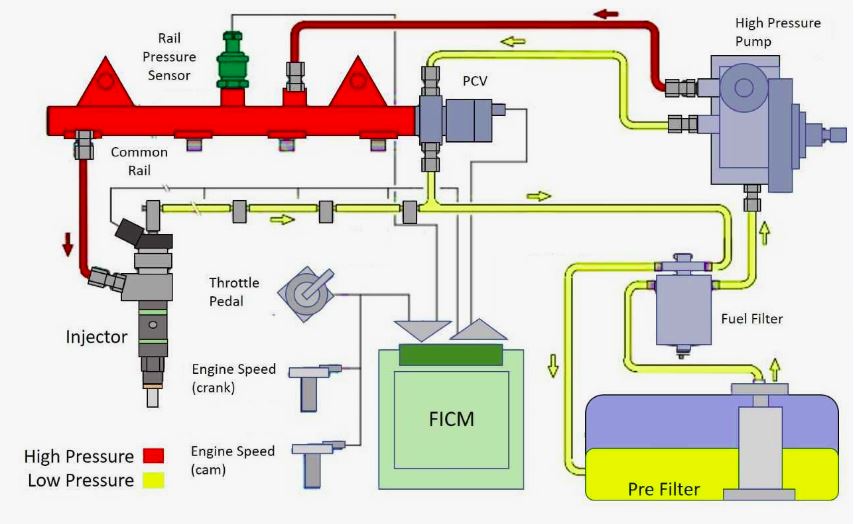
Causes:
- Thick or Incorrect Oil
- Cold Weather
- Clogged Oil Passages
- Faulty Relief Valve
- Dirty Oil Filter
- Worn Engine Bearings
- Faulty Oil Pressure Sending Unit
Prevention:
- Use the Correct Oil: Always use the oil type and viscosity recommended by the vehicle manufacturer.
- Regular Oil Changes: Change the oil at regular intervals to ensure it remains clean and free from contaminants.
- Maintain Oil Filter: Replace the oil filter during oil changes to prevent blockages.
- Inspect Oil Passages: Ensure oil passages are clean and free from debris.
- Check Relief Valve: Regularly inspect and replace the oil pressure relief valve if necessary.
Bad Sending Unit
A faulty oil pressure sending unit can give false readings on the oil pressure gauge, indicating high oil pressure when it is not actually the case. This can lead to unnecessary concerns and potential misdiagnosis of the engine’s condition.
Clogged Oil Passages
Malfunctioning Relief Valve
The diesel oil pressure relief valve is designed to regulate oil pressure within the engine. If this valve malfunctions or gets stuck, it can cause oil pressure to rise excessively, leading to potential engine damage.
Contaminated Oil Filter
Wrong Oil
What Happens to Your Vehicle When the Oil Pressure is Too High?

When diesel engine oil pressure range is too high of pressure of oil, it can cause several problems:
- Oil Leaks: Excessive pressure can cause oil to leak from seals and gaskets.
- Engine Damage: High pressure can lead to insufficient lubrication, causing wear and tear on engine components.
- Overheating: Lack of proper lubrication can cause the engine to overheat.
- Increased Strain: High oil pressure puts additional strain on the engine, potentially leading to premature failure of components.
How to Prevent High Oil Pressure
- Change the Oil Regularly: Regular oil changes keep the oil clean and free from contaminants, preventing blockages and ensuring proper lubrication.
- Perform Maintenance Every Year: Regular maintenance checks can identify potential issues before they become serious problems.
- Use the Correct Oil: Always use the recommended oil type and viscosity for your engine.
- Replace the Oil Filter: Replace the oil filter during every oil change to prevent blockages.
- Inspect Oil Passages and Relief Valve: Ensure oil passages are clear and the relief valve is functioning correctly.
Change the Oil Regularly
Regular oil changes are essential for maintaining proper for normal diesel oil pressure and ensuring the longevity of your engine. Clean oil provides better lubrication and prevents blockages in the oil passages.
Perform Maintenance Every Year
Where to Get Replacements for Parts Damaged by High Oil Pressure
If high oil pressure has caused damage to your engine components, it is crucial to get high-quality replacement parts. You can obtain these from:
- Authorized Dealerships: Genuine parts from authorized dealerships ensure compatibility and reliability.
- Reputable Auto Parts Stores: Trusted auto parts stores provide high-quality aftermarket parts.
- Online Retailers: Websites like Amazon, AutoZone, and RockAuto offer a wide selection of parts for various vehicles.
What is normal oil pressure diesel engine?
The normal diesel engine oil pressure for a diesel engine typically ranges between 40 to 60 PSI (pounds per square inch) when the engine is running at operating temperature. At idle, it can be lower, around 10 to 30 PSI, depending on the engine type and condition. Maintaining proper oil pressure ensures adequate lubrication and prevents engine wear. If the pressure is too low or too high, it may indicate issues like oil leaks, clogged filters, or a failing oil pump or oil pressure on diesel engine. Always refer to the manufacturer’s specifications for precise values.
Final Thoughts
Engine oil gauge high in a diesel engine can indicate underlying issues that need attention to prevent damage. Regular maintenance, using the correct oil, and promptly addressing any signs of high oil pressure can help maintain your engine’s health and performance. Always refer to your vehicle’s owner manual for specific recommendations and follow a consistent maintenance schedule to avoid problems associated with high oil pressure.
FAQs
High oil pressure, often indicated by a gauge reading or warning light, typically means there’s excessive resistance to oil flow within the engine. Key causes include:
Using Incorrect Oil Viscosity: The most common cause. Oil that is too thick (e.g., a higher SAE weight than specified, like 20W-50 in a cold engine) does not flow easily, creating high pressure.
Faulty Oil Pressure Relief Valve: This valve is designed to open and bypass oil to regulate pressure. If it’s stuck closed or malfunctioning, pressure will rise unchecked.
Blocked Oil Passages: Sludge, debris, or contaminated oil can obstruct the narrow oil galleries, restricting flow and increasing pressure.
Faulty Oil Pressure Sender/Gauge: Often, the issue is not mechanical but electrical. A failing sensor or inaccurate gauge can give a false high reading.
Cold Engine Operation: Oil is naturally thicker when cold. A brief period of higher pressure at startup is normal, but it should drop as the engine warms.
A diesel engine typically has an oil pressure of 30–60 psi under normal operation and 20–30 psi at idle. During a cold start, pressure may briefly reach 60–80 psi before stabilizing.
Low pressure (<15 psi at idle) may indicate leaks, worn parts, or low oil.
High pressure (>80 psi) could signal a blockage or wrong oil viscosity.
Always check the manufacturer’s recommended range for your specific engine. Proper maintenance ensures stable oil pressure and engine health.
Safe Minimum Lube Oil Pressure in Diesel Engines:
Idle (warm): 10–15 psi
Under load: 25–30 psi
Below these? Risk engine damage!
Causes: Low oil, worn parts, wrong oil, or sensor issues.
Fix: Stop engine, check oil level/quality, inspect pump/bearings.
The normal oil pressure for a diesel engine typically ranges between 30 to 60 psi (2 to 4 bar) at operating temperature and 40 to 80 psi (2.7 to 5.5 bar) when cold.
Idle pressure: ~15–25 psi (1–1.7 bar)
Full load/running pressure: ~40–60 psi (2.7–4 bar)
Yes, high oil pressure can cause oil leaks, insufficient lubrication, engine overheating, increased strain on engine components, and potentially severe engine damage.
can high oil pressure damage an engine, Yes using oil with the wrong viscosity or type can cause high oil pressure. Always use the oil recommended by your vehicle’s manufacturer.
If your oil pressure gauge shows high pressure, check the oil level, ensure you are using the correct oil, inspect the oil filter and passages, and have a mechanic check the oil pressure relief valve and sending unit.
Yes, a clogged or dirty oil filter can restrict oil flow, leading to increased oil pressure. Replacing the oil filter regularly can prevent this issue.
Change the oil according to the manufacturer’s recommended interval, typically every 5,000 to 7,500 miles, or more frequently if driving under severe conditions.
The oil pressure on a diesel engine should typically be between 40 to 60 PSI at operating speed. At idle, it may drop to 10 to 30 PSI, depending on the engine design. Proper oil pressure is crucial for lubrication, cooling, and reducing engine wear. If the pressure is too low or too high, it could indicate problems like oil leaks, clogged filters, or a faulty oil pump. Always check the manufacturer’s specifications for the correct pressure range for your engine.
To fix high oil pressure, check the oil level and use the correct viscosity. Replace a clogged oil filter and inspect the pressure sensor for faults. Ensure the oil pump and relief valve function properly. Clean any blockages in oil passages and maintain proper engine temperature. If the issue persists, seek professional help.
Driving with high oil pressure is not recommended as it can lead to engine damage. If the pressure is slightly high, you may drive for a short distance to a repair shop. However, prolonged driving can cause seal leaks, oil pump failure, or even engine wear. It’s best to diagnose and fix the issue as soon as possible to avoid costly repairs.
Yes, overfilling your engine with oil can cause high oil pressure. Excess oil can create excessive resistance within the crankcase, leading to increased pressure in the lubrication system. This may result in oil foaming, reduced lubrication efficiency, and potential damage to seals, gaskets, and engine components. To prevent this, always maintain the correct oil level as specified in your vehicle’s manual.
It is normal for oil pressure to rise when accelerating because the engine’s RPM increases, causing the oil pump to circulate oil faster. However, excessively high oil pressure during acceleration may indicate a clogged oil filter, a malfunctioning pressure relief valve, or using oil with the wrong viscosity. If the pressure remains too high, it could lead to seal damage or oil leaks. Regular maintenance and using the recommended oil type can help prevent issues.
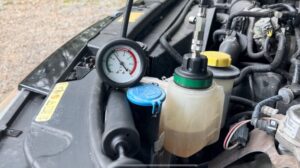
Radiator Stop Leak UAE: Quick Fix for Vehicle Cooling System Leaks
Radiator Stop Leak UAE: Quick Fix for Vehicle Cooling System Leaks Discover More Introduction: The Unforgiving UAE Climate and Your Vehicle’s Lifeline The United Arab Emirates’ automotive landscape is defined by extremes. Ambient temperatures that regularly surpass 45°C (113°F), coupled with intense urban congestion and long, high-speed desert drives, create a perfect storm of thermal stress for every vehicle. In this environment, your engine cooling system is not merely a subsystem; it is the single most critical component preventing catastrophic engine failure.
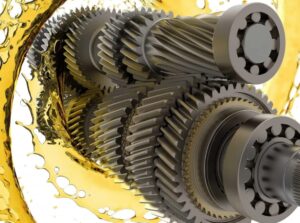
What Type of Transmission Oil in UAE Does My Car Need? Your Complete Guide
What Type of Transmission Oil in UAE Does My Car Need? Your Complete Guide Discover More Navigating the vast, sun-baked highways of the United Arab Emirates—from the dynamic urban sprawls of Dubai and Abu Dhabi to the majestic desert dunes and the tranquil mountain passes of the Hajar range—places extraordinary mechanical and thermal stress on every component of your vehicle. While conscientious drivers often prioritize engine oil changes, the vital lifeblood safeguarding the transmission, the complex heart of your car’s

Guide to UAE Turbine Oil Selection Application & Management for Industrial Facilities
Guide to UAE Turbine Oil Selection, Application, and Management for Industrial Facilities Discover More In the hyper-competitive industrial landscape of the United Arab Emirates, where operational excellence directly translates to economic advantage, turbine lubrication represents a critical nexus of reliability engineering and strategic asset management. This comprehensive guide, developed with technical insights from Rumanza Lubricants, provides an unprecedented deep dive into the science, selection criteria, and life-cycle management of turbine oils specifically engineered for the extreme operating conditions of the

Synthetic vs. Mineral Hydraulic Oil in UAE : Which is Best for Your Operation?
Synthetic vs. Mineral Hydraulic Oil in UAE : Which is Best for Your Operation? Discover More Across the dynamic landscape of the United Arab Emirates—from the megaprojects of Dubai Marina to the intricate conveyor systems of Jebel Ali Port, from the massive hydraulic shovels in Al Dhafra quarries to the precision automated lines in Abu Dhabi’s industrial cities—the silent, powerful force of hydraulics is indispensable. These systems convert fluid power into monumental force and precise motion. At the core of

What is a Pour Point Depressant? | Benefits, Uses & How It Works Mechanism
What is a Pour Point Depressant? | Benefits, Uses & How It Works Mechanism Discover More In the intricate world of lubricant formulation, few additives play as critical yet understated a role in cold-weather operability as Pour Point Depressants (PPDs). These specialized chemical compounds are the linchpin that prevents machinery from seizing up when temperatures plummet. This in-depth guide goes beyond the basics, exploring the sophisticated chemistry, detailed mechanism, nuanced benefits, and practical considerations of PPDs. We will also examine the

Guide to Gasoline Engine Oils for UAE’s Extreme Climate: Engineering Peak Performance
Gasoline Engine Oils for UAE’s Extreme Climate: Engineering Peak Performance Discover More In the heart of the Arabian Peninsula, the United Arab Emirates stands as a testament to human ambition, with its engineering marvels and endless highways. Yet, this environment of soaring achievement is also one of the most punishing on Earth for machinery. For your vehicle—whether a nimble city sedan, a powerful family SUV, or a high-performance sports car—the UAE’s climate is a relentless adversary. The choice of engine

What are Polyol Ester Oils & Lubricants – Properties & Applications
What are Polyol Ester Oils & Lubricants – Properties & Applications Discover More In the intricate world of industrial machinery, automotive engines, and advanced refrigeration systems, the choice of lubricant is not merely a maintenance task—it’s a critical engineering decision. While conventional mineral oils have served us for over a century, the demands of modern technology require fluids that can perform under extreme pressure, temperature, and environmental stress. This is where synthetic lubricants, specifically Polyol Ester oils, come to the forefront.
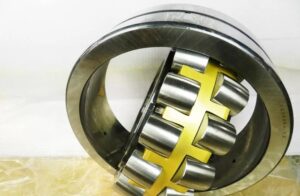
Guide to Choosing the Right Lithium Complex Grease in UAE
Guide to Choosing the Right Lithium Complex Grease in UAE for Unbeatable Performance Discover More In the heart of a region defined by its ambition and extreme climate, the machinery that builds and powers the UAE operates under immense pressure. From the towering cranes sculpting Dubai’s skyline to the massive haul trucks in Abu Dhabi’s industrial zones and the relentless conveyor systems in Jebel Ali Port, every moving part is a critical link in the chain of progress. Protecting these

Lithium Grease UAE – Buy Multi-Purpose Lubricant Grease
Lithium Grease UAE – Buy Multi-Purpose Lubricant Grease Discover More In the relentless engine of the United Arab Emirates’ economy—where monumental construction, non-stop logistics, and a climate of extreme heat and abrasive sand are the norm—the battle against friction and corrosion is perpetual. The integrity of a construction crane’s slewing ring, the smooth operation of a delivery fleet’s wheel bearings, and the silent efficiency of a hotel’s HVAC system all hinge on a single, critical decision: the choice of lubricant.
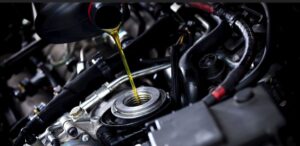
Best CNG Engine Oil in UAE for Cars – Protect Your CNG Engine
Best CNG Engine Oil in UAE for Cars – Protect Your CNG Engine Discover More The automotive landscape in the UAE is undergoing a quiet revolution. As fuel prices fluctuate and environmental consciousness grows, more and more drivers are making the intelligent switch to Compressed Natural Gas (CNG). CNG-powered cars offer significant cost savings on fuel and produce fewer emissions, making them an economically and ecologically sound choice. However, this transition comes with a critical responsibility: understanding that a CNG

Calcium Sulphonate Grease UAE | High-Temperature Grease
Calcium Sulphonate Grease UAE | High-Temperature Grease Discover More Introduction: The Unforgiving Demands of UAE Industry The United Arab Emirates stands as a global titan of industry and infrastructure. From the sprawling metallurgical plants in Mussafah and the massive port operations of Jebel Ali to the relentless pace of construction shaping Dubai’s skyline and the vast logistics hubs of Al Ain, the machinery that powers this nation operates under extreme duress. Soaring ambient temperatures that regularly exceed 45°C, pervasive dust